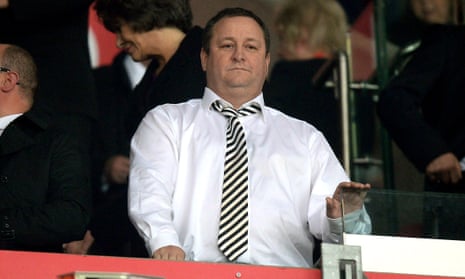Mike Ashley finally appears ready to sell Newcastle United after 10 turbulent, often unpopular years in charge, following the club’s promotion back to the Premier League. It is unclear how solid the reality is of the Chinese investors rumoured to be interested in buying Newcastle, given that overseas football takeovers have now been restrained in China, but it is seen as significant that Ashley has not moved to deny reports.
In recent years Ashley has moved strongly to reject periodic reports that he is preparing to sell the club, which he bought for £134m from Freddy Shepherd and Sir John Hall’s families in 2007, but this time Newcastle merely offered no comment. One of Ashley’s key operators in his Sports Direct businesses, Justin Barnes, was increasingly seen at St James’ Park last season, adding to perceptions that Ashley might be preparing the club for a sale.
Reports emerged on Monday that Chinese investors are in talks to invest in Newcastle, but so far none have been identified. In 2015 China’s president Xi Jinping’s call for China to buy into football led to a flurry of very expensive player signings by Chinese clubs, and Chinese business interests buying clubs including Aston Villa, Wolverhampton Wanderers, West Bromwich Albion and Birmingham City. China Media Capital also purchased a 13% stake in the holding company of Manchester City. After such huge expenditure, Xi’s attitude changed; in January a government spokesman said “irrational spending” in football would be curbed, and since then the flow of Chinese takeovers has stalled.
Ashley previously signalled his willingness to sell Newcastle after his chaotic first two years in charge culminated in relegation to the Championship in 2009 . When no buyer materialised, he resolved to run the club less as a trophy asset and more as part of his business empire, streamlining procedures, cutting costs and branding St James’ Park with Sports Direct advertising. He has loaned £129m interest-free, paying off debts built up by the previous owners, and will want that back, plus his initial investment and a hearty profit for a sale, potentially around £400m.
Newcastle United’s most recent financial statements, for the relegation season of 2015-16, show the club made income of £126m, the Premier League’s ninth highest, and a £4m pre-tax profit. Run by managing director Lee Charnley, Newcastle are assumed to have coped financially with relegation, and Ashley has said publicly that the huge windfall from promotion into the Premier League’s booming TV deal will enable cash to be spent on players.
That financial position, the retention of Rafael Benítez as manager, and Newcastle’s status as one of England’s truly big and well-supported clubs, add up to an attractive prospect, in principle.
